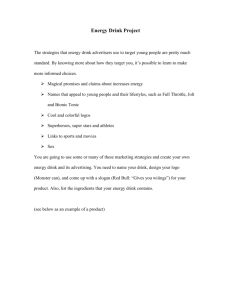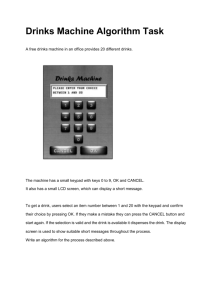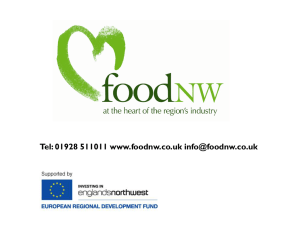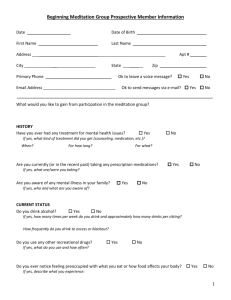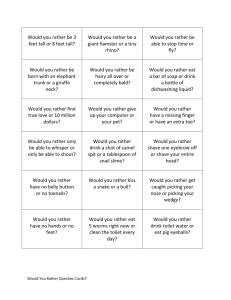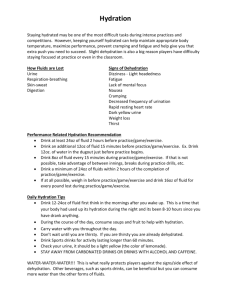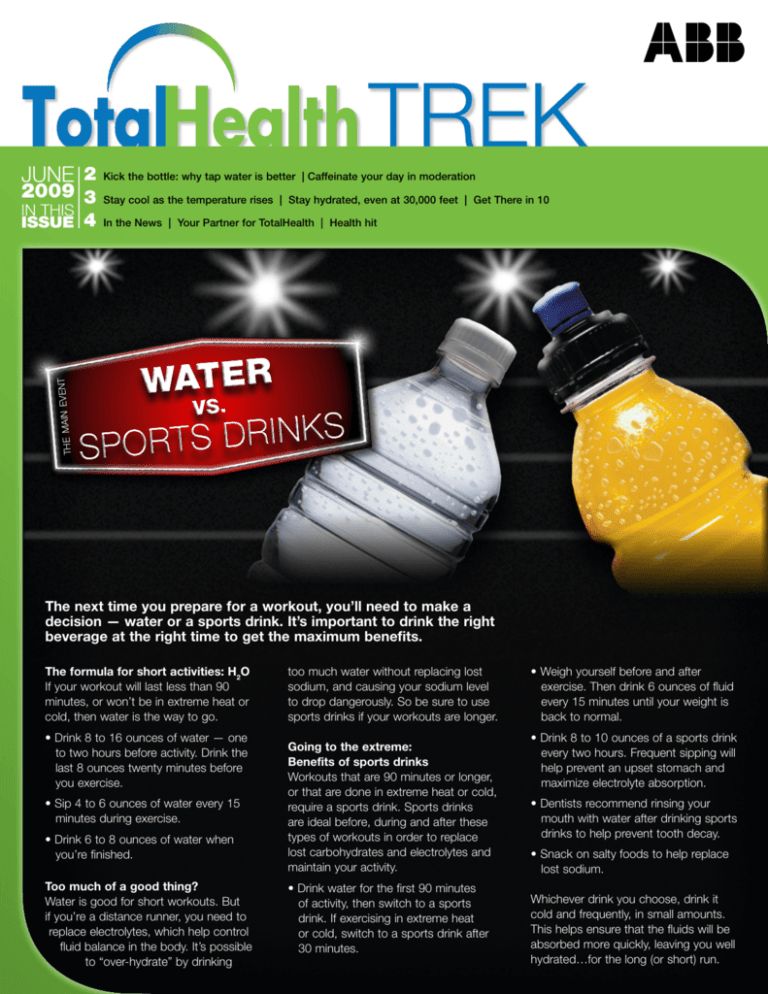
JUNE 2
2009 3
ent
the main ev
In This
Issue
4
TREK
Kick the bottle: why tap water is better | Caffeinate your day in moderation
Stay cool as the temperature rises | Stay hydrated, even at 30,000 feet | Get There in 10
In the News | Your Partner for TotalHealth | Health hit
water
vs.
s
k
n
i
r
d
s
t
r
spo
The next time you prepare for a workout, you’ll need to make a
decision — water or a sports drink. It’s important to drink the right
beverage at the right time to get the maximum benefits.
The formula for short activities: H2O
If your workout will last less than 90
minutes, or won’t be in extreme heat or
cold, then water is the way to go.
• Drink 8 to 16 ounces of water — one
to two hours before activity. Drink the
last 8 ounces twenty minutes before
you exercise.
• Sip 4 to 6 ounces of water every 15
minutes during exercise.
• Drink 6 to 8 ounces of water when
you’re finished.
Too much of a good thing?
Water is good for short workouts. But
if you’re a distance runner, you need to
replace electrolytes, which help control
fluid balance in the body. It’s possible
to “over-hydrate” by drinking
too much water without replacing lost
sodium, and causing your sodium level
to drop dangerously. So be sure to use
sports drinks if your workouts are longer.
Going to the extreme:
Benefits of sports drinks
Workouts that are 90 minutes or longer,
or that are done in extreme heat or cold,
require a sports drink. Sports drinks
are ideal before, during and after these
types of workouts in order to replace
lost carbohydrates and electrolytes and
maintain your activity.
• Drink water for the first 90 minutes
of activity, then switch to a sports
drink. If exercising in extreme heat
or cold, switch to a sports drink after
30 minutes.
• Weigh yourself before and after
exercise. Then drink 6 ounces of fluid
every 15 minutes until your weight is
back to normal.
• Drink 8 to 10 ounces of a sports drink
every two hours. Frequent sipping will
help prevent an upset stomach and
maximize electrolyte absorption.
• Dentists recommend rinsing your
mouth with water after drinking sports
drinks to help prevent tooth decay.
• Snack on salty foods to help replace
lost sodium.
Whichever drink you choose, drink it
cold and frequently, in small amounts.
This helps ensure that the fluids will be
absorbed more quickly, leaving you well
hydrated…for the long (or short) run.
2
Kick the bottle:
why tap water is better
Sales of bottled water have soared in recent years as more and more people choose
water instead of sugary beverages. That’s a good thing. But is bottled water really a
better alternative than tap water? Consider these points:
Bottled Water Tap Water
Safety
Environment
Taste
Fluoride
Cost
Caffeinaatye
your d
ion
at
in moder
For many people, caffeine
isn’t just the preferred
way to wake up, it’s also
the pick-me-up of choice
to keep them going
throughout the day.
PP
A study conducted by the Natural Resources Defense Council
concluded that bottled water is no safer or healthier than most
tap water. In fact, both are regulated by the government. The
Environmental Protection Agency (EPA) monitors tap water, while
the Food and Drug Administration (FDA) oversees bottled water.
P
The negative effects of bottled water on the environment are well
documented. Bottles take oil to produce and transport, while
leaving a mountain of waste behind.
PP
Some people choose to drink bottled water because they dislike
the taste of tap water. To enhance the taste, add a twist of
lemon or other flavorings to tap water.
Most bottled water does not contain fluoride like tap water. This
be a consideration for families with kids — knowing that
P should
it’s important for them to get the fluoride they need.
P
The biggest factor to consider when comparing bottled water to
tap water may be cost. A New York Times reporter calculated
that eight glasses (a day) of New York City tap water would cost
about 49 cents per year. The same amount of bottled water
would cost a whopping $1,400 per year!
How much caffeine is too much?
Two to four cups of coffee a day won’t cause problems
for most people. But, if you feel like you’re just getting
going after drinking your fifth cup of coffee — you might
want to consider cutting back.
Break the caffeine cycle
Side effects from consuming too much
caffeine include:
• Nervousness • Headaches
• Insomnia
• Anxiety
• Irritability
• Fast or irregular heartbeat
• Muscle tremors
Pay attention
Monitor how much caffeine you’re
getting from foods and beverages.
The darker side of caffeine
Some people are more sensitive to caffeine than others.
People who don’t regularly consume caffeine tend to
be more sensitive to its negative effects.
Other items that may contribute to caffeine
sensitivity include:
• Weight • Smoking habit
• Age
• Drug or hormone use
• Stress • Health conditions (such as anxiety disorders)
Give caffeine a rest
Most adults need seven to eight hours of sleep each
day. Caffeine can interfere with this much-needed sleep.
Even small nightly decreases in sleep can accumulate —
making you less alert and productive during the day. A
good rule of thumb is to avoid drinks containing caffeine
for eight hours before you go to bed. Your body doesn’t
store caffeine, but it does take time to eliminate it.
It can be tough to quit caffeine all
at once. Here are a few things that
you can try to help reduce your
dependence on caffeine:
Cut back — gradually
Drink one less soda, or drink
smaller cups of coffee each day.
This will help your body get used
to the lower levels of caffeine and
lessen your withdrawal symptoms.
Go decaf
Most decaffeinated drinks taste the
same as the caffeinated versions.
Make it quick
When making tea, brew it for
less time. This cuts down the
caffeine content.
Dig the herbs
Choose herbal teas, which don’t
contain caffeine.
Check the label
Over-the-counter pain relievers can
contain caffeine — as much as
130 mg in one dose. Try caffeine-free
pain relievers instead.
Stay cool as the
temperature rises
Heat stroke can strike without warning,
especially for the very young, the elderly, and
people working outdoors. A heat stroke occurs
when a person cannot produce enough sweat to
cool the body. Some tips to prevent heat stroke:
Drink
It Up!
3
ten
• Stay hydrated with water or sports drinks
• Don’t spend a lot of time outside during
extremely hot weather
• Avoid alcohol, tea, soda and coffee
• Don’t exercise outside during the hottest
time of the day
• Stay in the shade if you’re going to spend
time outside
Milk is packed with essential nutrients that are important for
your health. The USDA recommends that average adults drink three cups of
low-fat dairy products per day to take advantage of these health benefits.
In honor of National Dairy Month, here’s the calorie count and the Percent
Daily Values* for an 8-ounce glass of fat-free milk.
• Wear a hat and lightweight, loose clothing
• Wear light-colored clothing — dark clothing
attracts heat
Zero Grams of Fat, 80 Calories
Call 911 if heat stroke is suspected.
Signs of heat stroke include:
• Seizures
• Confusion
• Dizziness
• Flushed, dry skin
• Headaches
• Fast heartbeat
Eight Grams of Protein
Until help arrives, move the person to a cool
place and remove excess clothing. Fan and
spray them with cool water and offer sips of
water if they’re awake.
A low-fat, low-calorie thirst-quencher.
Milk contains essential building blocks of protein that help build
lean muscle.
30% Calcium
Helps build and maintain strong bones and teeth,
while reducing the risk of broken bones and bone
loss. Calcium also helps stabilize blood pressure.
25% Vitamin D
Assists the absorption of calcium for healthy bones.
Stay hydrated,
even at 30,000 feet
20% Phosphorus
The air inside the cabin of an airplane can be
very dry, causing dehydration and making the
symptoms of jet lag more severe. That’s why
it’s important to stay properly hydrated before,
during and after your flight. Consider these
five tips to help lessen the effects of jet lag:
20% Riboflavin
1. Make sure that you’re well rested and
you’ll have an easier time getting back to your
normal sleep pattern.
2. Drink a glass of water or juice before your
flight and then each hour during the flight.
3. Stick to a healthy diet by avoiding fatty or
salty foods that promote dehydration.
4. Skip alcoholic and caffeinated beverages
in-flight, because they promote dehydration.
5. Continue drinking fluids once you reach
your destination — and drink extra fluids for
several days.
There’s no secret formula to prevent jet lag, but
staying well hydrated is a great way to start.
Works with calcium and vitamin D to help keep
bones strong.
Helps convert food into energy and plays a vital role
in the development of the nervous system.
13% Vitamin B-12
Works closely with other B vitamins to make red blood
cells and helps maintain your central nervous system.
11% Potassium
Helps regulate fluid balance in your body. It also helps
stabilize your blood pressure.
10% Niacin
Helps your body digest food.
10% Vitamin A
Supports good vision, healthy skin and maintains your
immune system.
* Percent Daily Values were developed by the FDA and reflect the
current nutrition recommendations for a 2,000 calorie diet.
4
Health hit
what’s happening in health news
ure
s
s
e
r
p
lood e?
b
h
g
i
h
Have heart diseas
or
he
Skip dt rinks.
energy
In a March 2009 study published in Annals of
Pharmacotherapy, researchers from the Henry Ford Hospital
found that adults who drank two cans of a popular energy
drink each day experienced an increase in their blood
pressure and heart rate. These increases in blood pressure
and heart rate were minimal for healthy adults, but could be
harmful to people with a heart-related condition.
The study
Researchers studied 15 healthy adult participants who didn’t
have any caffeine for two days prior to, and during, the study.
On the first day — after a measurement of blood pressure,
heart rate, and EKG — the adults drank two cans of an
energy drink, or the equivalent of two to four cups of coffee.
Researchers then measured the participants’ blood pressure,
heart rate and EKG again at 30 minutes and one, two, three
and four hours after consumption. The participants then drank
two cans of the energy drink a day, for the next five days.
On the seventh day, blood pressure, heart rate, and
EKG measurements were taken and compared to the
numbers collected on day one. Researchers found that the
participants’ heart rate increased 7.8 percent the first day
and 11 percent by the seventh day. They also discovered
blood pressure increased at least 7 percent between the first
and seventh days.
Just say no
Based on the findings, it’s recommended that people who
are taking medication for high blood pressure or heart
disease avoid energy drinks because of a potential
increased health risk.
Your
partner
for
Express Scripts®
It’s important to learn as much as you can about the
medications you take. It’s a challenge to keep up to date
with information like dosages, side effects, generic versions
and cost. That’s why ABB offers you prescription medication
benefits through Express Scripts.
Log on to www.express-scripts.com to view your plan
and other valuable information, including:
• A preferred drug list
• Your prescription drug history
• Checking interactions and side effects of drugs
• Comparing drug co-pays and coverage under your plan
Plus, as an Express Scripts member, you’ll have the opportunity
to save money on your prescriptions by ordering online.
Call 1.877.650.9413 for more information on your plan and
the benefits available to you.
­­ In the news
Got HEALTH? June Is
National Dairy Month
Your mother always told you to drink your milk, and here’s why —
research studies have shown that dairy products may also help
to reduce the risk of several diseases:
Osteoporosis
Osteoporosis is the abnormal loss of bony tissue resulting in
brittle bones due to a lack of calcium. Dairy products contribute a
large portion of calcium in the food supply.
High blood pressure
A diet that contains low-fat dairy and is rich in fruits and
vegetables can help lower blood pressure — especially when
combined with low sodium intake.
Obesity
Low-fat dairy foods such as milk, yogurt and cheese may help
control body fat, according to several studies.
Colon cancer
A study published in The New England Journal of Medicine
showed that calcium might help reduce the risk of colon tumors.
Go to www.mypyramid.gov for more information about what
you can eat and drink to help maintain a healthy lifestyle.
© 2009 Nationwide Better Health. All Rights Reserved. The content of this newsletter may not be reproduced in any form without the written permission of Nationwide Better Health. This monthly newsletter is written by a team of credentialed and licensed health
professionals, medical writers and journalists. The medical information contained in it is not intended to be a substitute for professional medical advice. Always seek the advice of your physician or another qualified health care provider. To contact us: 1.877.777.3150,
Nationwide Better Health, 6565 Davis Industrial Parkway, Suite A, Solon, Ohio 44139.

